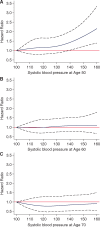Association between systolic blood pressure and dementia in the Whitehall II cohort study: role of age, duration, and threshold used to define hypertension
- PMID: 29901708
- PMCID: PMC6122131
- DOI: 10.1093/eurheartj/ehy288
Association between systolic blood pressure and dementia in the Whitehall II cohort study: role of age, duration, and threshold used to define hypertension
Abstract
Aims: To examine associations of diastolic and systolic blood pressure (SBP) at age 50, 60, and 70 years with incidence of dementia, and whether cardiovascular disease (CVD) over the follow-up mediates this association.
Methods and results: Systolic and diastolic blood pressure were measured on 8639 persons (32.5% women) from the Whitehall II cohort study in 1985, 1991, 1997, and 2003. Incidence of dementia (n dementia/n total = 385/8639) was ascertained from electronic health records followed-up until 2017. Cubic splines using continuous blood pressure measures suggested SBP ≥130 mmHg at age 50 but not at age 60 or 70 was associated with increased risk of dementia, confirmed in Cox regression analyses adjusted for sociodemographic factors, health behaviours, and time varying chronic conditions [hazard ratio (HR) 1.38; 95% confidence interval (95% CI) 1.11, 1.70]. Diastolic blood pressure was not associated with dementia. Participants with longer exposure to hypertension (SBP ≥ 130 mmHg) between mean ages of 45 and 61 years had an increased risk of dementia compared to those with no or low exposure to hypertension (HR 1.29, 95% CI 1.00, 1.66). In multi-state models, SBP ≥ 130 mmHg at 50 years of age was associated with greater risk of dementia in those free of CVD over the follow-up (HR 1.47, 95% CI 1.15, 1.87).
Conclusion: Systolic blood pressure ≥130 mmHg at age 50, below the conventional ≥140 mmHg threshold used to define hypertension, is associated with increased risk of dementia; in these persons this excess risk is independent of CVD.
Figures


Comment in
-
Preventing dementia beyond treating hypertension.Eur Heart J. 2018 Sep 1;39(33):3126-3127. doi: 10.1093/eurheartj/ehy409. Eur Heart J. 2018. PMID: 30052872 No abstract available.
References
-
- Peters R, Beckett N, Forette F, Tuomilehto J, Clarke R, Ritchie C, Waldman A, Walton I, Poulter R, Ma S, Comsa M, Burch L, Fletcher A, Bulpitt C, Invest H.. Incident dementia and blood pressure lowering in the Hypertension in the Very Elderly Trial cognitive function assessment (HYVET-COG): a double-blind, placebo controlled trial. Lancet Neurol 2008;7:683–689. - PubMed
-
- Tzourio C, Anderson C, Chapman N, Woodward M, Neal B, MacMahon S, Chalmers J, Grp PC.. Effects of blood pressure lowering with perindopril and indapamide therapy on dementia and cognitive decline in patients with cerebrovascular disease. Arch Intern Med 2003;163:1069–1075. - PubMed
-
- Tzourio C, Laurent S, Debette S.. Is hypertension associated with an accelerated aging of the brain? Hypertension 2014;63:894–903. - PubMed
-
- Li G, Rhew IC, Shofer JB, Kukull WA, Breitner JCS, Peskind E, Bowen JD, McCormick W, Teri L, Crane PK, Larson EB.. Age-varying association between blood pressure and risk of dementia in those aged 65 and older: a community-based prospective cohort study. J Am Geriatr Soc 2007;55:1161–1167. - PubMed
-
- Qiu CX, Winblad B, Fratiglioni L.. The age-dependent relation of blood pressure to cognitive function and dementia. Lancet Neurol 2005;4:487–499. - PubMed
Publication types
MeSH terms
Grants and funding
LinkOut - more resources
Full Text Sources
Other Literature Sources
Medical

